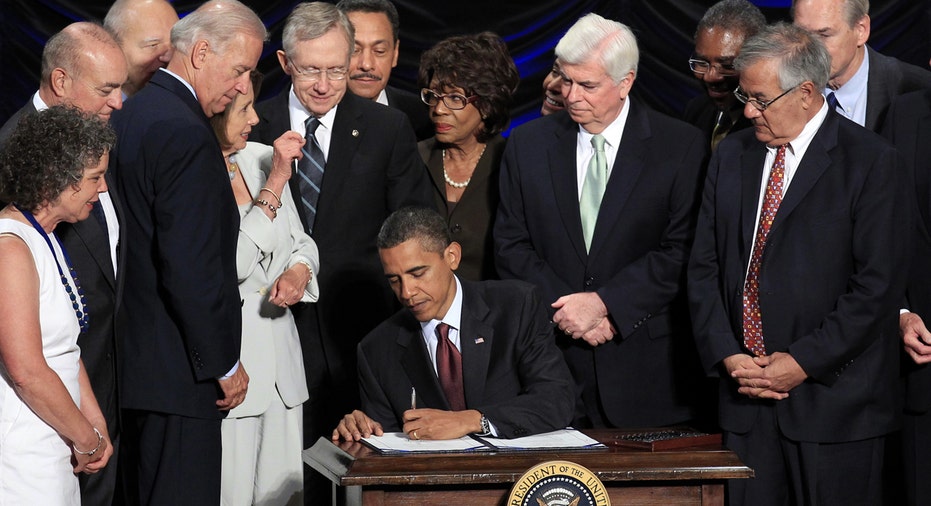Repealing Dodd-Frank Easier Said Than Done

Repealing the sprawling Dodd-Frank banking reform legislation will be easier said than done.
The Republican candidates who will appear Tuesday at the GOP debates in Milwaukee sponsored by the FOX Business Network and the Wall Street Journal will undoubtedly find that out should they win the nomination and eventually defeat a Democratic opponent in 2016.
“It could be done but the hassles for financial institutions that have already made adjustments would be enormous,” said Jay Ritter, a finance professor at the University of Florida.
All of the GOP candidates have regularly taken aim at what they describe as the hyper-regulatory environment of the Obama administration, arguing that too much government oversight of business has stunted economic growth as the U.S. has struggled to recover from the 2008 financial crisis.
The massive Dodd-Frank bill, a signature policy achievement of the Obama presidency, has been singled out for, in the views of these candidates, being too complicated and burdensome, and in some glaring cases -- scaling down too-big-too-fail banks for instance -- having the exact opposite effect it was intended for.
Many of the candidates – notably Marco Rubio, Donald Trump, Ted Cruz, Rand Paul, Carly Fiorina and Mike Huckabee – have said in no uncertain terms one of their first priorities as president would be to repeal the extensive array of new regulations imposed on the U.S. banking industry under Dodd-Frank.
Pointed Criticisms
Other candidates – Jeb Bush, John Kasich and Chris Christie for instance – have offered similarly pointed criticisms while not necessarily calling for its outright repeal. This camp has said significant reforms or rolling back aspects might suffice.
Rubio has been one of the more outspoken candidates in his criticism of the legislation. On at least four occasions since the law was enacted with bi-partisan support in 2010 the Florida senator has cast votes that would either directly or indirectly scale back regulatory powers enabled under the law. And in case anyone was unclear on his position, Rubio wasted no time during the first GOP debate in August, declaring, “We need to repeal Dodd-Frank.”
In an interview with Washington, D.C., news outlet The Hill, Trump called Dodd-Frank “terrible” and said he would “absolutely” repeal it. Cruz, Paul, Fiorina and Huckabee have expressed similar sentiments in various public forums (debates, interviews, op-ed pieces).
Expect the rhetoric in opposition to Dodd-Frank to heat up again Tuesday as the debate will be focused primarily on economic issues.
Ritter said those candidates who in the past have called for a repeal of the bill will likely continue to do so despite how unlikely it might be to actually pull off the feat. He said articulating a nuanced approach toward restructuring the wildly complex bill probably wouldn’t play well during a televised debate. So candidates opt for the cleaner, more easily digested claim of repeal instead.
“There are certainly some aspects of the bill that could be deleted or scaled back,” Ritter said, “but that’s not good television.”
Even Less Likely to Happen
The intent of the bill, which weighed in at more than 2,300 pages, is to prevent another large-scale crisis of the kind that nearly sank the global economy in 2008. In addition to the scores of initiatives requiring banks to rein in risks, the bill also created the Bureau of Consumer Financial Protection to serve as a watchdog for U.S. consumers.
But, like any sweeping reform effort, there have been unintended consequences, both real and perceived.
New Jersey Governor Christie gave voice to some of these concerns at a recent event in New Hampshire. Christie, echoing the concerns of many Dodd-Frank critics, said the legislation was unintentionally helping the big banks it was supposed to hold in check while punishing small community banks that can’t afford to keep up with the bill’s costly and cumbersome requirements.
“Dodd-Frank has hurt Main Street. Credit is not flowing to middle America. The percentage of banks’ balance sheets devoted to making loans and leases is at its lowest level since 1978… And the number of banks in the United States has actually shrunk to its lowest level in over a century. So even while Dodd-Frank had the effect of increasing the too big to fail problem by concentrating the power of the big banks, it has actually curtailed lending to small businesses by the smaller banks who are economically vital,” Christie said.
Ritter said a subject as sprawling and controversial as Dodd-Frank and banking reform requires a longer form of dialogue not generally favored by candidates – especially during televised debates -- eager to offer quick soundbites.
Consequently, while actually repealing the legislation is unlikely to happen, Ritter said even less likely to happen is a detailed discussion among the candidates of the specific aspects of the bill that are flawed and need to be fixed.
FOX Business Network and the Wall Street Journal will present two Republican presidential primary debates in conjunction with the Republican National Committee (RNC) on November 10, 2015. The debates will focus on the economy and be presented live from the Milwaukee Theatre in Milwaukee, WI, on FBN and FOXBusiness.com. Debate coverage begins at 7PM ET.



















